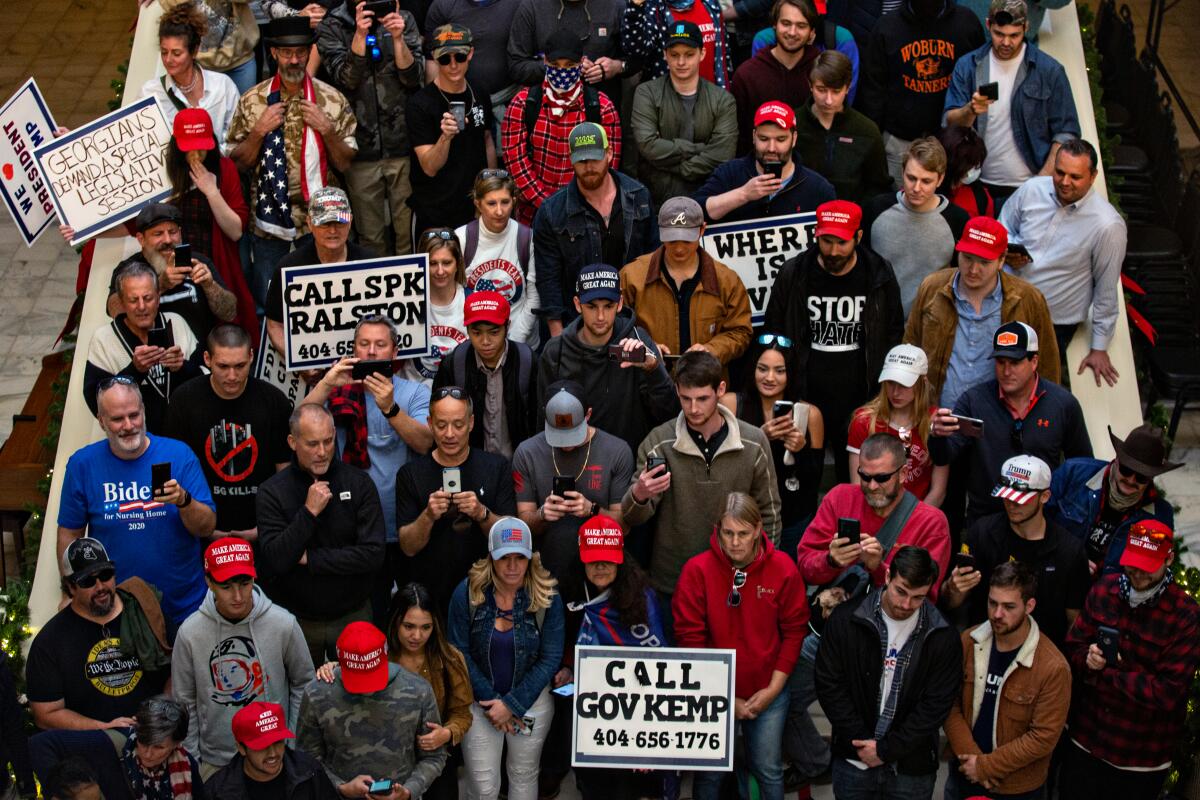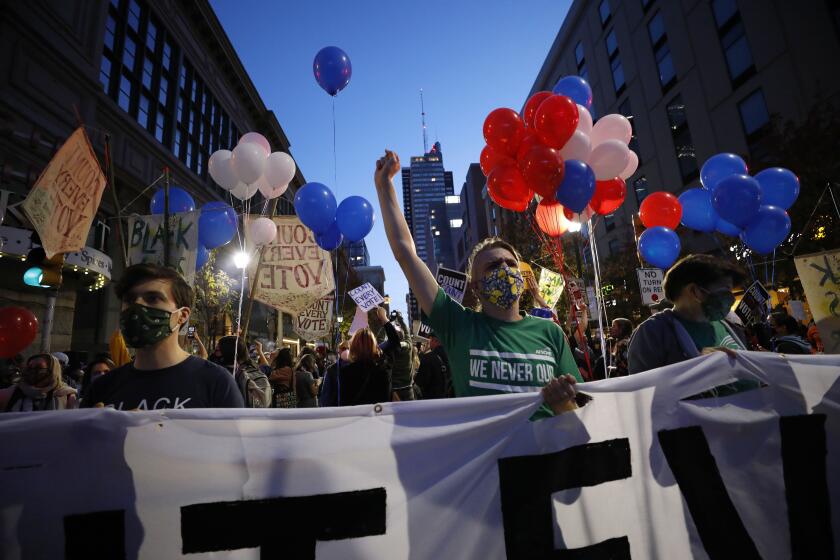Trump allies explored sending armed private contractors to seize voting machines in 2020 election

- Share via
WASHINGTON — Supporters on the fringes of former President Trump’s circle explored seeking sweeping authority after the 2020 election to enlist armed private contractors to seize and inspect voting machines and election data with the assistance of U.S. marshals, according to a draft letter asking the president to grant them permission.
The previously undisclosed “authorizing letter” and accompanying emails were sent on Nov. 21, 2020, from a person involved in efforts to find evidence of fraud in the election that year. The documents, which were reviewed by The Times, are believed to be among those in the possession of the House Jan. 6 committee, which is scheduled to begin public hearings Thursday.
The letter appears to be one of the earliest iterations of a draft executive order presented to the then-president in the Oval Office on Dec. 18, 2020, by then- Trump lawyer Sidney Powell, former national security advisor Michael Flynn and former Overstock.com Chief Executive Patrick Byrne in an effort to take control of voting machines.
The email and attached draft letter were sent to Cyber Ninjas Chief Executive Doug Logan and cybersecurity expert Jim Penrose by Andrew Whitney, a British technology entrepreneur who made his way inside Trump’s circle in 2020 after he sought the president’s support for Oleandrin, a toxic botanical extract Whitney claimed was a miracle cure for COVID-19. Logan, who went on to conduct a partisan “audit” of election results in Maricopa County, Ariz., and Penrose worked for weeks after the 2020 election with a group including Powell, Flynn and Byrne that sought access to voting machines in an attempt to find proof of election fraud.
Whitney and Penrose did not respond to requests from The Times seeking comment, and Logan declined an interview request.
Election officials in several states are worried about the safety of their staffs amid a stream of threats and protesters who support President Trump.
The Nov. 21, 2020, letter includes placeholder text at the top for an introduction conveying the document came from the president. The letter would have granted authority to three third-party companies to seize all election machines and election data at will, and given the companies and their subcontractors the authority to research, obtain and store offsite “all data and/or code regarding U.S. election fraud, election manipulation, voter fraud, election interference, voter eligibility, and election systems wherever it resides.”
The directive also would have allowed the companies to inspect and analyze any records or equipment related to the election, as well as details about who had contact with them and when. In addition, the letter specified that the U.S. Marshals Service would assist the effort, and the employees of private companies authorized to perform the work would be “granted the authority to be armed when conducting these investigations since most of the operations would be conducted under hostile conditions.”
Two of the three cyber-security companies named in the letter are led by men who had been part of the weeks-long efforts to find evidence of election fraud: Russell Ramsland of Dallas-based Allied Security Operations Group, who would go on to conduct an “audit” of the Antrim County, Mich., results that the Trump campaign cited as proof of fraud; and retired Army Col. Phil Waldron of Rising Tide LLC, who worked with the then-president’s attorney, Rudolph W. Giuliani, on efforts to persuade state lawmakers and Republicans in Congress to examine the election results.
Waldron and Ramsland did not respond to requests for comment.
The third company mentioned in the letter, Axon Global Services LLC, has no known connection to efforts to find evidence of fraud during the 2020 election.
When contacted by The Times, company owner Israel Martinez said he was unsure why his name was included in the letter.
“I was not privy to the document you mentioned nor was my name nor my company name listed with my authorization. Moreover, I would be angered by any implication that we would take a partisan view in any engagement we are asked to conduct,” Martinez said in a statement. “We would never approach any potential evaluation of a cyber incident with a partisan view.”
A new poll finds a growing sense of menace as Trump and followers press the “big lie” of a stolen 2020 election.
Two hours after the email was sent to Logan and Penrose on Nov. 21, 2020, a separate message was sent to pro-Trump attorney Lin Wood with the subject line “suggested language for ‘cover letter.’” The email to Wood, a central figure in the Trump campaign’s effort to promote conspiracy theories about the 2020 election in Georgia, included an
attached letter with the same language that was written as if it came from an attorney rather than the president.
“I don’t deny receiving it, but I didn’t do anything with it,” Wood said in an interview with The Times. “I never reviewed or revised any memo that would have dealt with the confiscation of machines or an executive order for Donald Trump. Of that I am certain.”
For the record:
11:56 a.m. June 5, 2022An earlier version of this story noted that Patrick Byrne said Phil Waldron repeatedly pushed to take an idea to obtain access to election machine data to the president. Byrne said that Waldron and Trump attorney Sidney Powell discussed the idea with the president’s attorney, Rudolph W. Giuliani.
The idea to obtain access to election machine data to look for fraud — through an executive order or other means — was floated several times after the election, and Waldron repeatedly pushed to take the idea to the president, several people involved in the effort told The Times. In an interview with The Times, Byrne said Waldron and Powell discussed it with Giuliani.
“They came back and said Rudy shot them down immediately,” Byrne said.
But the idea didn’t go away. It is unclear who wrote the final version of the proposed executive order. But in February, Politico published emails dated Dec. 16 and Dec. 17, 2020, that indicated Flynn and Waldron were workshopping a draft of an executive order to seize voting machines and voting data.
The Dec. 16 version of the order would have tasked the Pentagon with seizing voting machines, rather than private companies. The draft dated the following day gave the Department of Homeland Security responsibility for taking possession of the machines and data.
Neither of those versions of the draft order would have given private companies the authority to seize or examine the machines, or allowed their workers to be armed during the process, though the drafts did call for the assistance of the National Guard. Both drafts sought to greenlight “the appointment of a special counsel to oversee this operation and institute all criminal and civil proceedings as appropriate based on the evidence collected and provided all resources necessary to carry out her duties consistent with federal laws and the Constitution.”
Elizabeth Goitein, co-director of the Brennan Center for Justice’s Liberty and National Security Program, said the draft outlined in the Nov. 21, 2020, letter reviewed by The Times doesn’t meet basic standards of an executive order because it doesn’t rely on existing legal authority to justify the actions.
“You can’t say, ‘Because this is in an executive order I therefore have the authority in the executive order,’” she said. “This appears to be sort of the fever dream of someone who either isn’t a lawyer or someone who didn’t do very well in law school.”
Former U.S. Cybersecurity and Infrastructure Security Agency Director Christopher Krebs, who was fired by Trump shortly after he made comments affirming the security of election machines, said the Nov. 21 draft appears to have been written by someone unfamiliar with executive orders and the authority they can and cannot grant.
Requesting that private contractors be armed to assist in the process of inspecting machines is “chilling” and “implies that whoever drafted this [letter] ... views this as some sort of warlike event,” Krebs said.
“You’re talking about issuing letters of marque effectively to a private sector organization to go do some sort of activity on behalf of that executive office of the president,” Krebs said. “A private sector organization has no authority to go and seize state government equipment. The federal government doesn’t even have that authority, particularly in the context of administering elections. And we are looking at a document that says that’s OK.”
More to Read
Get the L.A. Times Politics newsletter
Deeply reported insights into legislation, politics and policy from Sacramento, Washington and beyond. In your inbox twice per week.
You may occasionally receive promotional content from the Los Angeles Times.













